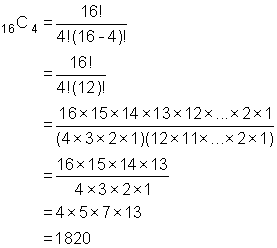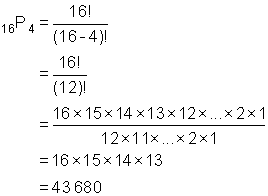Focus G: Determining the Number of Possible Combinations
Test yourself (Answers)
-
Since each of the top 4 players receives $37 500,
the order in which they finish does not matter. You simply have to
be in the top 4 to receive the same amount. This is an example of
combinations, specifically "16 choose 4". From the formula
we get:

- Since the amount you receive depends on your position in the top
4, order matters. This is thus an example of permutations,
specifically "16 permute 4". From the formula we get:

|

